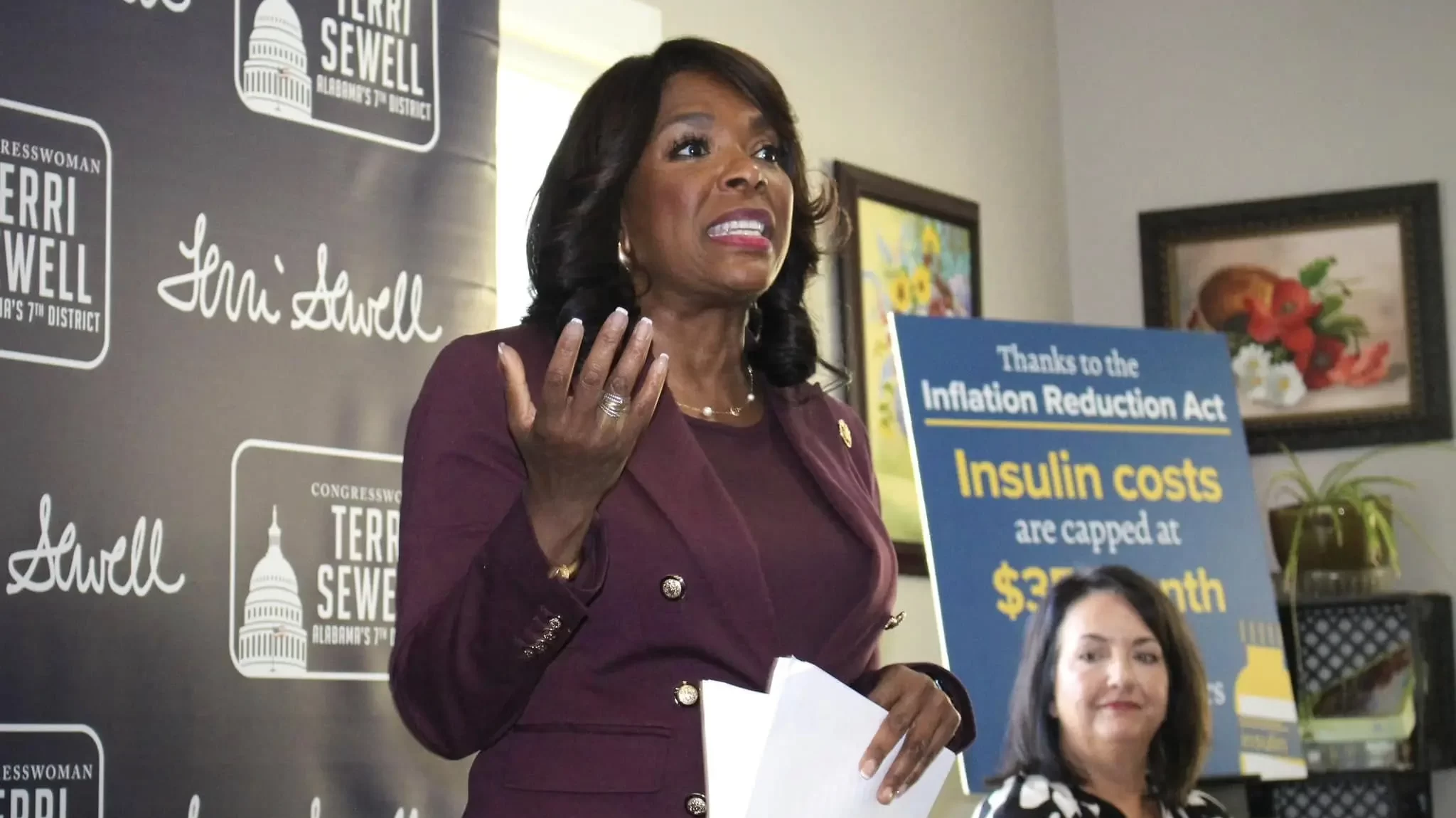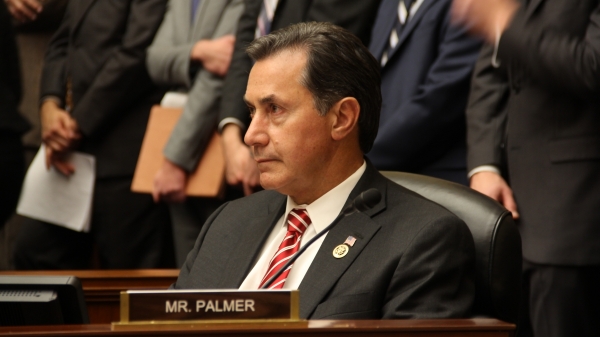|
Getting your Trinity Audio player ready...
|
U.S. Rep. Terri Sewell, D-Ala. discussed the impact of federal funding cuts on her district during a Wednesday town hall meeting in Fort Deposit.
She was joined in a panel featuring Lowndes County health and education leaders who fielded questions regarding the impact of funding cuts on their work and what programs citizens can continue to use to meet their needs.
Sewell said the town hall was an opportunity to highlight valuable services provided to her constituents by federal funding—services Sewell said are “under attack currently by the Trump administration.”
Sewell highlighted cuts in the 2026 budget proposal passed in the U.S. House of Representatives last month. The budget included $4 trillion worth of cuts to “programs Americans rely on,” according to Sewell.
“Why? In order to give a tax breaks to the giant corporations and millionaires and billionaires. Not to us,” Sewell said.
“President Trump has made it clear in his agenda that billionaires like Elon Musk are rewarded and Alabama communities like the one here Fort Deposit foot the bill,” she said. “It’s outrageous and it’s unacceptable, I hope you know that I will be fighting back.”
Sewell went on to criticize the Trump administration’s decision from earlier this month to terminate an environmental justice agreement reached between the U.S. Department of Justice and Alabama Department of Public Health in 2023, meant to help correct widespread wastewater sanitation issues in Lowndes county.
“This agreement was years in the making. It had nothing to do with diversity equity and inclusion. It was about addressing a public health crisis which has forced generations of children and families in Lowndes county to endure the health hazards of living in proximity to raw sewage,” Sewell said.
“They have a disregard for the constituents I represent. It’s unacceptable. It’s absolutely outrageous and cruel,” she said of the Trump administration.
Assistant Attorney General for the Justice Department’s Civil Rights Division Harmeet K. Dhillon said in a press release the termination of the agreement was a step directed by the Trump administration “to eradicate illegal DEI preferences and environmental justice across the government and in the private sector.”
“The DOJ will no longer push ‘environmental justice’ as viewed through a distorting, DEI lens,” Dhillon said.
Sewell said, in light of the current administration backing out of the agreement, the Alabama Department of Public Health must step in to address sewage issues in Lowndes county.
“I made it perfectly clear that I expected the Department of Health in Alabama and the State of Alabama to honor its commitment to do something about this injustice. We will all be watching,” Sewell said of a meeting she had earlier in the day with Scott Harris of ADPH.
Sewell thanked Sherry Bradley of the Black Belt Unincorporated Wastewater Authority, a program which uses federal funding to help Black Belt residents install septic tanks.
Sewell also criticized to the proposed budget’s $800 billion in cuts to Medicaid and $230 billion in funding cuts to the Supplemental Nutrition Assistance Program. Sewell said almost 200,000 people in her district rely on SNAP benefits.
She also pointed to the potential negative effects of the Trump administration firing over 7,000 Social Security Administration employees, or 15 percent of its workforce, since February.
“It’s hard already for people to get access to the Social Security Administration, and now they have fired thousands of employees, they’ve closed field offices, they’ve restricted telephone services; making it more difficult for our seniors to get the benefits they’re owed,” Sewell said.
“I have voted no more often in the last less than 100 days than I have in my whole tenure as a member of Congress,” Sewell continued, “But, you know what? When it comes to fighting for the people that I love and represent in Alabama’s 7th Congressional District, I will continue to say no—hell no—to the cuts that are affecting our communities.”
During the town hall, Sewell was also joined by a panel of guests to discuss issues funding cuts pose to low income and rural individuals. Guests included Lowndes County Superintendent Samita L. Jeter, Health Services Inc. CEO Gilbert Darrington, Heart of Alabama Foodbank CEO Michael Coleman and South Central Alabama Development Commission program coordinator for Lowndes County, Mary Wedgeworth.
Rep. Sewell and Darrington opened the panel by discussing the impacts of Medicaid cuts on Alabama.
“We already have a bare-bones program in Alabama as it stands,” Darrington said, saying currently a family of three must make less than $4,800 to qualify for the service.
Darrington said by cutting access to Medicaid treatment in Alabama, 45 percent of which is received by children, pediatric health issues that could be corrected by routine dental and medical check-ups will compound lower quality of life later in adulthood.
Sewell asked Coleman to explain how his work would be impacted by cuts to SNAP benefits.
Coleman said his organization, which services 35 counties across the state, is on pace to distribute 34 million pounds or over 28 million meals in 2025. He said, of the people Heart of Alabama Foodbank serves, half already don’t qualify for SNAP benefits.
“They’re just above that barrier that they don’t qualify, but they still have challenges. They still have real needs,” Coleman said.
“We’re already struggling just to meet the need as it is,” he continued. “If the SNAP benefits are cut… hunger doesn’t go away. Need doesn’t go away. It’s gonna go somewhere and that means that people are gonna turn to the only network that’s out there, and that’s the foodbank network.”
Coleman said federal funding cuts have already caused his organization to lose $500,000 in yearly funding. He also said 23 truckloads of food scheduled to be delivered to the foodbank in the coming months have been cancelled.
Jeter discussed the potential impact of the U.S. Department of Education being dismantled and federal funding cuts on Lowndes County Schools.
She pointed to Head Start, a program which provides assistance with early childhood care to low income families, which the Trump administration intends to dismantle.
“Recently we are beginning to be concerned that Head Start will be cut,” Jeter said. “It’s been here in Lowndes County over 50 years so to lose Head Start.. that would be very detrimental to our community.”
Sewell ended the town hall by encouraging attendees to remain informed on issues being discussed that impact them on the local and national levels.
“We have to be more civically engaged,” Rep. Sewell said. “Those letters, those calls matter.”
“The worst thing is to have a citizenry that’s uninformed or misinformed,” she said. “Coming out to community conversations and town halls like this are so important, because we as elected officials, we have to be held accountable to our people who elected us.”



















































